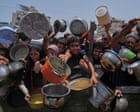
In a region often marked by waves of conflict and complex dynamics, recent developments in Gaza have drawn international attention and concern. In the past 24 hours, at least 57 lives were lost amid ongoing tensions between Israeli forces and local populations. These casualties have come amidst a backdrop of faltering ceasefire discussions, highlighting the need for renewed efforts towards peace and humanitarian relief.
The atmosphere in Gaza has been tense, with many of those affected being caught in difficult circumstances while in pursuit of essential aid. Amidst dwindling resources, mass gatherings have become common near the Zikim crossing, a primary point of hoped-for accessibility to aid delivery from Israel. As humanitarian needs escalate, many individuals, seeking to secure basic necessities, were tragically met with violence.
This situation has been further exacerbated by the broader humanitarian crisis impacting Gaza. Humanitarian organizations have noted an acute rise in malnutrition, particularly affecting children under five, as the availability of food becomes scarce due to ongoing blockades. Human rights advocates have continued to call attention to the escalating crisis, urging for swift action to alleviate the suffering of civilians.
Amidst these events, diplomatic efforts have faced their own challenges. The Israeli government has opted to withdraw from ongoing ceasefire negotiations taking place in Doha. According to multiple reports, Israeli Prime Minister Netanyahu is exploring what have been termed “alternative options” to these talks. This decision signifies a pivotal shift in the Israeli administration’s approach, casting uncertainties over the immediate future of any potential peace efforts.
Observers point to the complexity of the situation, where longstanding grievances and strategic interests create barriers to progress. The dynamics of these discussions often encompass a mix of security concerns, political leverage, and the humanitarian imperative. Despite this, the prevailing hope among many in the international community remains pegged to an eventual resurgence of dialogue aiming to halt further violence and improve conditions on the ground.
The current scenario in Gaza is a stark reminder of the region’s multifaceted challenges. Many believe that a holistic approach, one that looks beyond immediate security concerns to also consider long-term peacebuilding and economic cooperation, remains crucial. Such an approach aims to foster sustainable development and conflict resolution strategies that address the root causes of recurring tensions.
As the global community watches, continued advocacy for humanitarian aid and international cooperation is imperative. The role of multilateral organizations, in collaboration with regional stakeholders, could be pivotal in navigating towards a more stable and peaceful resolution. Meanwhile, solidarity and support from citizens around the world may also provide additional pressure towards reaching a more peaceful future for Gaza and its people.
In these uncertain times, reflection on shared human values and empathy towards those experiencing these adversities may serve as reminders of the urgency in addressing the crisis. While the road to peace may be fraught with challenges, the collective hope for healing and understanding within the region remains a beacon for those advocating for a better tomorrow.
Source: {link}
